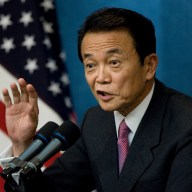 From left, Iranian Foreign Minister Mohammad Javad Zarif, Chinese Foreign Minister Wang Yi, U.S. Secretary of State John Kerry, Russian Foreign Minister Sergei Lavrov and French Foreign Minister Laurent Fabius on Nov. 24 in Geneva.
From left, Iranian Foreign Minister Mohammad Javad Zarif, Chinese Foreign Minister Wang Yi, U.S. Secretary of State John Kerry, Russian Foreign Minister Sergei Lavrov and French Foreign Minister Laurent Fabius on Nov. 24 in Geneva.
Credit: Getty Images
In a groundbreaking agreement, Iran has agreed to halt nuclear enrichment in exchange for a partial lifting of international sanctions. But what does the deal mean?
Metro spoke with Michael Elleman, a Bahrain-based senior fellow at the International Institute for Strategic Studies. Elleman is a respected expert on Iran with good contacts on both the Iranian and American sides.
Metro: How important is the agreement?
Elleman: It’s an interim agreement, and the first step of many, but it’s an important step for several reasons. Firstly, it establishes contact between the U.S. and Iran. There have been several attempts at doing that over the past 30 years, but none has been successful. It also puts institutions in place that will maintain contact between Iran and its negotiation partners. That will be very helpful for issues [that] come up along the way. Lastly, the Iranians acknowledge that they have enough 20 percent-enriched uranium, and have also agreed to halt construction of their nuclear reactor.
What about verification?
Iran has accepted very important measures. With this agreement, it agrees to daily inspections as opposed to twice weekly, which is what we’ve had before. The international inspectors will also meet all the engineers and scientists, which is very important, because if you know the people you’ll notice if they’re missing. In other words, it would be very difficult for Iran to start a secret nuclear program now.
Who deserves credit for the agreement?
All sides made important concessions. If it had only been the U.S. and Iran negotiating, people would have pointed the finger at Obama for being weak. Now, with the U.N. Security Council’s five permanent members, plus Germany and the EU, involved, it gives the agreement credibility. The Omanis are unsung heroes, because they hosted the secret negotiations leading up to the Geneva talks.
















